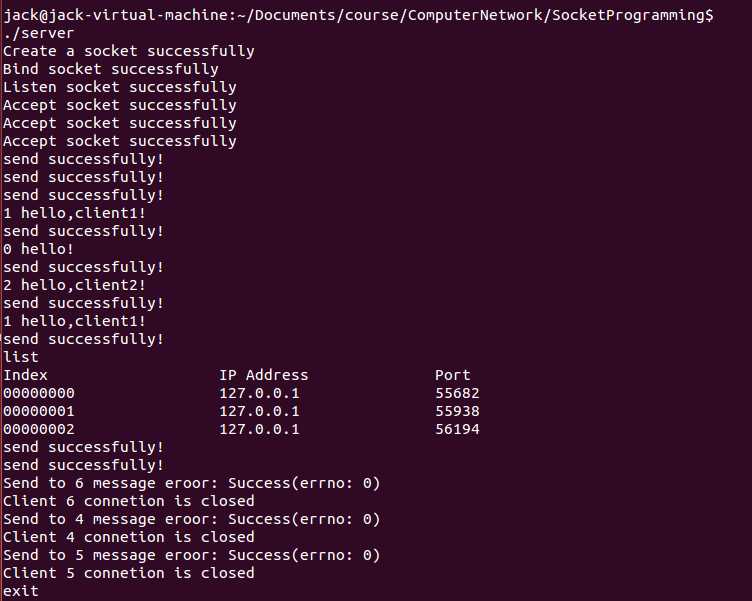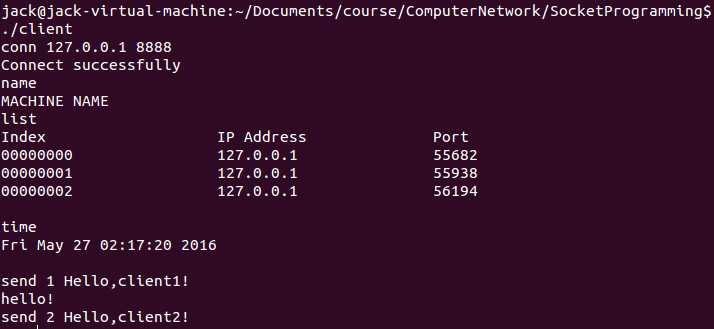标签:
服务端的程序的设计主要是一个主线程首先调用Socket相关的函数socket,bind, listen在建立服务端的Socket之后,等待Accept上面,如果有新的客户端连接上来,则对于每一个客户端新建一个线程。在每一个客户端的线程中,其接收客户端发送的指令然后返回相关的信息,主线程Socket中默认的Accpet默认是阻塞的,这里采用了Linux中函数fctnl将其设置成非阻塞。除了客户端对应的线程和主线程之外,服务端还存在一个服务端的控制线程,其主要是接受服务端的命令,诸如退出,断开连接等等,对服务端的程序进行控制。
客户端的程序为一个阻塞的循环,接受用户的输入然后解析命令进行相关的操作,诸如连接服务端,发送数据等等操作
服务端的程序主要包括主线程接受客户端请求响应建立客户端对应线程,客户端命令执行,服务端主要控制模块。
首先建立服务端Socket连接,其过程如下:
最后服务端的主要是在一个循环中,其中最前面的serverExit主要是为了交互需要,后面会详细介绍。服务端调用Accept函数进行接收一个客户端的信息,如果存在连接上的客户端,则为其分配一个线程位置,然后调用pthread_create创建一个线程,并且将该客户端的信息参数传入线程。这里采用一个结构体的方式记录了客户端的相关信息,包括客户端IP,端口号,编号,是否连接等等。
这里为了防止服务器的无限的创建线程,设置了最大同时在线的客户端数目(MAXCONN),如果新连接上的客户端发现已经操作上线,那么该主线程就会睡眠,其等待在了一个客户端断开连接的信号量上面,如果有客户端断开连接,则主线程被唤醒,接受该客户端的连接。
需要注意的是这里涉及到很多的多线程的操作,很有可能发生数据冲突,需要很好使用pthread中的互斥锁防止发生数据冲突。
其主要是阻塞的接受客户端发送上来的命令,然后解析命令,对应每个命令进行不同的操作,将结果通过send函数发送给对应的客户端。这里主要实现了disconn断开连接,name返回客户端,list返回所有连接的客户端的信息(IP,端口,编号等等),send向别的客户端发送数据。
对于name和time命令只要将数据以字符串的形式发送给对应的客户端即可,而对于disconn命令,需要发送一个断开的信号,使得等待在这个信号量上的客户端能够连接上服务端,对于send命令需要根据发送的地址获取到目的的客户端信息,相对应的客户端发送相关的消息。服务端的程序另一个需要的是需要进行错误处理,诸如客户端的命令错误,格式错误,网络错误等等异常情况,其需要进行相应的报错,并且提供给客户端或者服务端相应的错误信息。
这里主要注意的是发送的数据需要指定数据的长度,而采用C的strlen指定的并不包括字符串最后的‘\0’,因此其不会发送出去。这里有两种解决方案,一种是接收方在数据的最后加上’\0’或者发送的时候将’\0’一同发送出去。
服务端控制程序主要提供了一些命令给服务端可以对于服务端连接的客户端以及自身退出。这里主要实现了exit退出服务端,list列出所有连接的客户端信息,kill关闭某个客户端命令。其中exit命令为退出客户端,其主要是将一个退出退出标志位设置成1,然后主线程判断该标志位为1的时候会关闭所有的客户端,并且取消所有的客户端线程以及服务端程序线程,然后自身退出。对于list命令其和服务端发送的list指令实现相同,kill命令主要是关闭对于对应的客户端的socket,然后取消其对应的线程。
1 #include <sys/types.h> 2 #include <sys/socket.h> 3 #include <netinet/in.h> 4 #include <arpa/inet.h> 5 #include <sys/time.h> 6 #include <stdio.h> 7 #include <errno.h> 8 #include <string.h> 9 #include <pthread.h> 10 #include <stdlib.h> 11 #include <fcntl.h> 12 #include <unistd.h> 13 14 #define PORT 8888 15 #define BACKLOG 10 16 #define MAXCONN 100 17 #define BUFFSIZE 1024 18 19 typedef unsigned char BYTE; 20 typedef struct ClientInfo 21 { 22 struct sockaddr_in addr; 23 int clientfd; 24 int isConn; 25 int index; 26 } ClientInfo; 27 28 pthread_mutex_t activeConnMutex; 29 pthread_mutex_t clientsMutex[MAXCONN]; 30 pthread_cond_t connDis; 31 32 pthread_t threadID[MAXCONN]; 33 pthread_t serverManagerID; 34 35 ClientInfo clients[MAXCONN]; 36 37 int serverExit = 0; 38 39 /*@brief Transform the all upper case 40 * 41 */ 42 void tolowerString(char *s) 43 { 44 int i=0; 45 while(i < strlen(s)) 46 { 47 s[i] = tolower(s[i]); 48 ++i; 49 } 50 } 51 52 void listAll(char *all) 53 { 54 int i=0, len = 0; 55 len += sprintf(all+len, "Index \t\tIP Address \t\tPort\n"); 56 for(;i<MAXCONN;++i) 57 { 58 pthread_mutex_lock(&clientsMutex[i]); 59 if(clients[i].isConn) 60 len += sprintf(all+len, "%.8d\t\t%s\t\t%d\n",clients[i].index, inet_ntoa(clients[i].addr.sin_addr), clients[i].addr.sin_port); 61 pthread_mutex_unlock(&clientsMutex[i]); 62 } 63 } 64 65 void clientManager(void* argv) 66 { 67 ClientInfo *client = (ClientInfo *)(argv); 68 69 BYTE buff[BUFFSIZE]; 70 int recvbytes; 71 72 int i=0; 73 int clientfd = client->clientfd; 74 struct sockaddr_in addr = client->addr; 75 int isConn = client->isConn; 76 int clientIndex = client->index; 77 78 while((recvbytes = recv(clientfd, buff, BUFFSIZE, 0)) != -1) 79 { 80 // buff[recvbytes] = ‘\0‘; 81 tolowerString(buff); //case-insensitive 82 83 char cmd[100]; 84 if((sscanf(buff, "%s", cmd)) == -1) //command error 85 { 86 char err[100]; 87 if(send(clientfd, err, strlen(err)+1, 0) == -1) 88 { 89 strcpy(err, "Error command and please enter again!\n"); 90 fprintf(stdout, "%d sends an eroor command\n", clientfd); 91 break; 92 } 93 } 94 else 95 { 96 char msg[BUFFSIZE]; //The message content 97 int dest = clientIndex; //message destination 98 int isMsg = 0; //any message needed to send 99 if(strcmp(cmd, "disconn") == 0) 100 { 101 pthread_cond_signal(&connDis); //send a disconnetion signal and the waiting client can get response 102 break; 103 } 104 else if(strcmp(cmd, "time") == 0) 105 { 106 time_t now; 107 struct tm *timenow; 108 time(&now); 109 timenow = localtime(&now); 110 strcpy(msg, asctime(timenow)); 111 isMsg = 1; 112 } 113 else if(strcmp(cmd, "name") == 0) 114 { 115 strcpy(msg, "MACHINE NAME"); 116 isMsg = 1; 117 } 118 else if(strcmp(cmd, "list") == 0) 119 { 120 listAll(msg); 121 isMsg = 1; 122 } 123 else if(strcmp(cmd, "send") == 0) 124 { 125 126 if(sscanf(buff+strlen(cmd)+1, "%d%s", &dest, msg)==-1 || dest >= MAXCONN) 127 { 128 char err[100]; 129 strcpy(err, "Destination ID error and please use list to check and enter again!\n"); 130 fprintf(stderr, "Close %d client eroor: %s(errno: %d)\n", clientfd, strerror(errno), errno); 131 break; 132 } 133 fprintf(stdout, "%d %s\n", dest, msg); 134 isMsg = 1; 135 } 136 else 137 { 138 char err[100]; 139 strcpy(err, "Unknown command and please enter again!\n"); 140 fprintf(stderr, "Send to %d message eroor: %s(errno: %d)\n", clientfd, strerror(errno), errno); 141 break; 142 } 143 144 145 if(isMsg) 146 { 147 pthread_mutex_lock(&clientsMutex[dest]); 148 if(clients[dest].isConn == 0) 149 { 150 sprintf(msg, "The destination is disconneted!"); 151 dest = clientIndex; 152 } 153 154 if(send(clients[dest].clientfd, msg, strlen(msg)+1, 0) == -1) 155 { 156 fprintf(stderr, "Send to %d message eroor: %s(errno: %d)\n", clientfd, strerror(errno), errno); 157 pthread_mutex_unlock(&clientsMutex[dest]); 158 break; 159 } 160 printf("send successfully!\n"); 161 pthread_mutex_unlock(&clientsMutex[dest]); 162 } 163 } //end else 164 } //end while 165 166 pthread_mutex_lock(&clientsMutex[clientIndex]); 167 client->isConn = 0; 168 pthread_mutex_unlock(&clientsMutex[clientIndex]); 169 170 if(close(clientfd) == -1) 171 fprintf(stderr, "Close %d client eroor: %s(errno: %d)\n", clientfd, strerror(errno), errno); 172 fprintf(stderr, "Client %d connetion is closed\n", clientfd); 173 174 pthread_exit(NULL); 175 } 176 177 void serverManager(void* argv) 178 { 179 while(1) 180 { 181 char cmd[100]; 182 scanf("%s", cmd); 183 tolowerString(cmd); 184 if(strcmp(cmd, "exit") == 0) 185 serverExit = 1; 186 else if(strcmp(cmd, "list") == 0) 187 { 188 char buff[BUFFSIZE]; 189 listAll(buff); 190 fprintf(stdout, "%s", buff); 191 } 192 else if(strcmp(cmd, "kill") == 0) 193 { 194 int clientIndex; 195 scanf("%d", &clientIndex); 196 if(clientIndex >= MAXCONN) 197 { 198 fprintf(stderr, "Unkown client!\n"); 199 continue; 200 } 201 pthread_mutex_lock(&clientsMutex[clientIndex]); 202 if(clients[clientIndex].isConn) 203 { 204 if(close(clients[clientIndex].clientfd) == -1) 205 fprintf(stderr, "Close %d client eroor: %s(errno: %d)\n", clients[clientIndex].clientfd, strerror(errno), errno); 206 } 207 else 208 { 209 fprintf(stderr, "Unknown client!\n"); 210 } 211 pthread_mutex_unlock(&clientsMutex[clientIndex]); 212 pthread_cancel(threadID[clientIndex]); 213 214 } 215 else 216 { 217 fprintf(stderr, "Unknown command!\n"); 218 } 219 } 220 } 221 222 int main() 223 { 224 int activeConn = 0; 225 226 //initialize the mutex 227 pthread_mutex_init(&activeConnMutex, NULL); 228 pthread_cond_init(&connDis, NULL); 229 int i=0; 230 for(;i<MAXCONN;++i) 231 pthread_mutex_init(&clientsMutex[i], NULL); 232 233 for(i=0;i<MAXCONN;++i) 234 clients[i].isConn = 0; 235 236 //create the server manager thread 237 pthread_create(&serverManagerID, NULL, (void *)(serverManager), NULL); 238 239 240 int listenfd; 241 struct sockaddr_in servaddr; 242 243 //create a socket 244 if((listenfd = socket(AF_INET, SOCK_STREAM, 0)) == -1) 245 { 246 fprintf(stderr, "Create socket error: %s(errno: %d)\n", strerror(errno), errno); 247 exit(0); 248 } 249 else 250 fprintf(stdout, "Create a socket successfully\n"); 251 252 fcntl(listenfd, F_SETFL, O_NONBLOCK); //set the socket non-block 253 254 //set the server address 255 memset(&servaddr, 0, sizeof(servaddr)); //initialize the server address 256 servaddr.sin_family = AF_INET; //AF_INET means using TCP protocol 257 servaddr.sin_addr.s_addr = htonl(INADDR_ANY); //any in address(there may more than one network card in the server) 258 servaddr.sin_port = htons(PORT); //set the port 259 260 //bind the server address with the socket 261 if(bind(listenfd, (struct sockaddr*)(&servaddr), sizeof(servaddr)) == -1) 262 { 263 fprintf(stderr, "Bind socket error: %s(errno: %d)\n", strerror(errno), errno); 264 exit(0); 265 } 266 else 267 fprintf(stdout, "Bind socket successfully\n"); 268 269 //listen 270 if(listen(listenfd, BACKLOG) == -1) 271 { 272 fprintf(stderr, "Listen socket error: %s(errno: %d)\n", strerror(errno), errno); 273 exit(0); 274 } 275 else 276 fprintf(stdout, "Listen socket successfully\n"); 277 278 279 while(1) 280 { 281 if(serverExit) 282 { 283 for(i=0;i<MAXCONN;++i) 284 { 285 if(clients[i].isConn) 286 { 287 if(close(clients[i].clientfd) == -1) //close the client 288 fprintf(stderr, "Close %d client eroor: %s(errno: %d)\n", clients[i].clientfd, strerror(errno), errno); 289 if(pthread_cancel(threadID[i]) != 0) //cancel the corresponding client thread 290 fprintf(stderr, "Cancel %d thread eroor: %s(errno: %d)\n", (int)(threadID[i]), strerror(errno), errno); 291 } 292 } 293 return 0; //main exit; 294 } 295 296 pthread_mutex_lock(&activeConnMutex); 297 if(activeConn >= MAXCONN) 298 pthread_cond_wait(&connDis, &activeConnMutex); 299 pthread_mutex_unlock(&activeConnMutex); 300 301 //find an empty postion for a new connnetion 302 int i=0; 303 while(i<MAXCONN) 304 { 305 pthread_mutex_lock(&clientsMutex[i]); 306 if(!clients[i].isConn) 307 { 308 pthread_mutex_unlock(&clientsMutex[i]); 309 break; 310 } 311 pthread_mutex_unlock(&clientsMutex[i]); 312 ++i; 313 } 314 315 //accept 316 struct sockaddr_in addr; 317 int clientfd; 318 int sin_size = sizeof(struct sockaddr_in); 319 if((clientfd = accept(listenfd, (struct sockaddr*)(&addr), &sin_size)) == -1) 320 { 321 sleep(1); 322 //fprintf(stderr, "Accept socket error: %s(errno: %d)\n", strerror(errno), errno); 323 continue; 324 //exit(0); 325 } 326 else 327 fprintf(stdout, "Accept socket successfully\n"); 328 329 pthread_mutex_lock(&clientsMutex[i]); 330 clients[i].clientfd = clientfd; 331 clients[i].addr = addr; 332 clients[i].isConn = 1; 333 clients[i].index = i; 334 pthread_mutex_unlock(&clientsMutex[i]); 335 336 //create a thread for a client 337 pthread_create(&threadID[i], NULL, (void *)clientManager, &clients[i]); 338 339 } //end-while 340 }
客户端程序主要可以分成客户端主线程控制和服务端消息接受程序。
客户端的程序较服务端的程序则简单的多,主要是接受用户的指令按照指令执行相关的任务。这里主要实现了conn连接服务器,disconn断开服务器连接,list查询服务器上的所有连接,name查看服务器名字,time查看时间,send先其他的客户端发送消息这些命令。
客户端首先必须通过conn命令连接上对应的服务器,然后可以执行其他的指令。用户通过time,name查看时间和机器名,如果需要发送消息,可以通过list查看所有连接,然后向指定的连接发送消息,quit退出客户端。
由于主线程为一个阻塞的线程,因此这里创建了一个接受服务器端的消息的线程。当用户通过conn命令连接上服务器之后,主线程就会创建该接受线程,其不断的监听服务器发回的消息,然后将其输入的屏幕上。当用户通过disconn命令取消连接的时候,主线程则就会取消掉这个线程。下面是该线程相关的代码。
1 #include <sys/types.h> 2 #include <sys/socket.h> 3 #include <stdio.h> 4 #include <netinet/in.h> 5 #include <arpa/inet.h> 6 #include <errno.h> 7 #include <unistd.h> 8 #include <string.h> 9 #include <stdlib.h> 10 #include <pthread.h> 11 12 #define BUFFERSIZE 1024 13 typedef unsigned char BYTE; 14 pthread_t receiveID; 15 16 void tolowerString(char *s) 17 { 18 int i=0; 19 while(i < strlen(s)) 20 { 21 s[i] = tolower(s[i]); 22 ++i; 23 } 24 } 25 26 void receive(void *argv) 27 { 28 int sockclient = *(int*)(argv); 29 BYTE recvbuff[BUFFERSIZE]; 30 while(recv(sockclient, recvbuff, sizeof(recvbuff), 0)!=-1) //receive 31 { 32 fputs(recvbuff, stdout); 33 fputs("\n", stdout); 34 } 35 fprintf(stderr, "Receive eroor: %s(errno: %d)\n", strerror(errno), errno); 36 } 37 38 int main() 39 { 40 ///define sockfd 41 int sockclient = socket(AF_INET,SOCK_STREAM, 0); 42 43 ///definet sockaddr_in 44 struct sockaddr_in servaddr; 45 memset(&servaddr, 0, sizeof(servaddr)); 46 47 int isConn = 0; 48 49 BYTE buff[BUFFERSIZE]; 50 51 52 while (fgets(buff, sizeof(buff), stdin) != NULL) 53 { 54 tolowerString(buff); 55 char cmd[100], ip[100]; 56 int port; 57 if(sscanf(buff, "%s", cmd) == -1) //command error 58 { 59 fprintf(stderr, "Input eroor: %s(errno: %d) And please input again\n", strerror(errno), errno); 60 continue; 61 } 62 if(strcmp(cmd, "conn") == 0) //connecton command 63 { 64 char ip[100]; 65 int port, ipLen=0; 66 if(sscanf(buff+strlen(cmd)+1, "%s", ip) == -1) //command error 67 { 68 fprintf(stderr, "Input eroor: %s(errno: %d) And please input again\n", strerror(errno), errno); 69 continue; 70 } 71 if((sscanf(buff+strlen(cmd)+strlen(ip)+2, "%d", &port)) == -1) //command error 72 { 73 fprintf(stderr, "Input eroor: %s(errno: %d) And please input again\n", strerror(errno), errno); 74 continue; 75 } 76 // fprintf(stdout, "%s %d\n",ip, port); 77 servaddr.sin_family = AF_INET; 78 servaddr.sin_port = htons(port); ///server port 79 servaddr.sin_addr.s_addr = inet_addr(ip); //server ip 80 if (connect(sockclient, (struct sockaddr *)&servaddr, sizeof(servaddr)) < 0) 81 { 82 fprintf(stderr, "Connect eroor: %s(errno: %d)\n", strerror(errno), errno); 83 continue; 84 } 85 fprintf(stdout, "Connect successfully\n"); 86 isConn = 1; 87 pthread_create(&receiveID, NULL, (void *)(receive), (void *)(&sockclient)); 88 } 89 else if(strcmp(cmd, "disconn") == 0) 90 { 91 if(isConn == 0) 92 { 93 fprintf(stdout, "There is not a connection!\n"); 94 continue; 95 } 96 else 97 { 98 pthread_cancel(receiveID); 99 close(sockclient); 100 } 101 isConn = 0; 102 } 103 else if(strcmp(cmd, "quit") == 0) 104 { 105 if(isConn) 106 { 107 pthread_cancel(receiveID); 108 close(sockclient); 109 } 110 return 0; 111 } 112 else 113 { 114 if(send(sockclient, buff, strlen(buff)+1, 0) == -1) //send 115 { 116 fprintf(stderr, "Send eroor: %s(errno: %d)\n", strerror(errno), errno); 117 continue; 118 } 119 120 if(isConn == 0) 121 { 122 fprintf(stdout, "Please use conn <ip> <port> command to build a connnection!\n"); 123 continue; 124 } 125 memset(buff, 0, sizeof(buff)); 126 } 127 } 128 129 close(sockclient); 130 return 0; 131 }
实验测试采用了3个客户端同时连接一个服务端进行测试。同时运行这四个程序,首先3个客户端通过conn命令连接上客户端,我们发现3个客户端都同时连接上,说明conn命令正常工作,socket建立正确。然后在客户端1中我们对一些命令进行测试,输入name发现返回了机器的名字,输入time返回了时间,输入list,方向其显示了3个客户端的连接信息。这说明了name,time和list都正常工作。然后在客户端中通过send命令先客户端2发送一条消息,发现客户端2收到了消息,然后客户端2回复了一条消息,客户端1也收到了消息。先客户端3发送消息,其也正常的收到,其发送消息给客户端2,客户端2也能正常收到。着说明了程序中send命令运行正常,能够进行消息的收发。最后客户端1,2,3都通过quit命令退出了客户端,并且服务器端收到了该退出的消息,并且关闭了该连接和线程,最后服务器端退出了。




标签:
原文地址:http://www.cnblogs.com/jackwang822/p/5533291.html